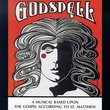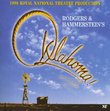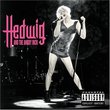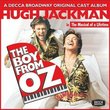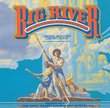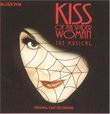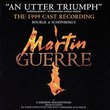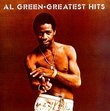| All Artists: Jason Robert Brown, Brent Carver, Carolee Carmello, Christy Carlson Romano, Rufus Bonds Title: Parade (1998 Original Broadway Cast) Members Wishing: 0 Total Copies: 0 Label: RCA Victor Broadway Original Release Date: 4/27/1999 Release Date: 4/27/1999 Album Type: Cast Recording Genres: Pop, Soundtracks, Broadway & Vocalists Style: Musicals Number of Discs: 1 SwapaCD Credits: 1 UPC: 090266337828 |
Search - Jason Robert Brown, Brent Carver, Carolee Carmello :: Parade (1998 Original Broadway Cast)
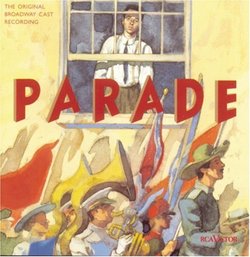 | Jason Robert Brown, Brent Carver, Carolee Carmello Parade (1998 Original Broadway Cast) Genres: Pop, Soundtracks, Broadway & Vocalists
The big winners at the 1999 Tony Awards were revivals or old dance numbers recycled into new shows. Yet earning the most nominations, nine (and taking home two awards, for book and original score), was an honest-to-goodne... more » |
Larger Image |
CD DetailsSynopsis
Amazon.com The big winners at the 1999 Tony Awards were revivals or old dance numbers recycled into new shows. Yet earning the most nominations, nine (and taking home two awards, for book and original score), was an honest-to-goodness new American musical by a young American composer-lyricist, Jason Robert Brown (who was 28 when the show premiered at Lincoln Center in December 1998 and was best known for his song cycle Songs for a New World). In addition, the subject matter is serious and dark, based on the true story of Leo Frank, a New York-born Jew living in Atlanta who was falsely accused of raping and murdering a young girl, and not surprisingly, the run was limited to 84 performances. The original cast recording survives, however, and from the stirring opening anthem, "The Old Red Hills of Home," Brown's score is full of riches, mixing period American styles with strong melodies, intricate counterpoint, selective dissonances, and natural lyrics that give their characters true, expressive voices. Leading the strong ensemble cast are Tony nominees Brent Carver and Carolee Carmello as the persecuted Leo and his wife, Lucille, who had been drifting apart before the wrenching events pulled them back together. They express their relationship in some of the show's best songs ("Leo at Work/What Am I Waiting For," "You Don't Know This Man," "All the Wasted Time"). Masterfully evoking scene and character through his beautiful, bouncy, or harrowing music, Brown depicts youthful abandon ("The Picture Show"), the city's hysteria, the tender memories of the girl's mourners ("It Don't Make Sense"), and the murder trial, including its fantasy scenes of false testimony. Parade is a powerful work that will long linger in your memory, and it's one of the most important musical theater releases of 1999. --David Horiuchi Similarly Requested CDs
|
CD ReviewsAbsolutely incredible!! reichheld@mediaone.net | MA | 06/19/1999 (5 out of 5 stars) "Wow...the score to Parade has left me utterly speechless. I have been purchasing most major cast recordings as soon as they are released for the past several years and I have yet to be more impressed by a score than I am by Jason Robert Brown's melodic, amazingly emotional score to this fantasitc musical. Unfortunately, I was not one of the lucky ones who got to see Parade when it was playing at the Vivian Beaumont. I'll admit that I, too, was deterred by the mixed to negative reviews. Oh, how mistaken those critics were. However, I have a feeling that Parade will be returning either on Broadway or as a national touring company sometime in the near future. Granted, Parade did lose the Tony for Best Musical of the year, but this is the same award that they gave to The Lion King over Ragtime and Phantom of the Opera over Sondheim's brilliant Into the Woods. Please..."I'll take 'lack of any credibilty whatsoever' for 500, Alex...". I refuse to believe that the public will allow what has the potential to be one of the greatest musicals of our time simply fade away into the darkness. Please, buy 'Parade' immediately! Don't let this overwhelmingly powerful experience pass you buy because of a few lousy reviews. Parade is an amazing creation. Believe it." Great musical, but some problems lie with the story... Katie | United States | 09/26/2005 (4 out of 5 stars) "Parade was the first I ever heard of the 1913 Leo Frank trial. I borrowed this cast recording from my local library and wasn't very eager to listen to it, knowing that it would be incredibly depressing. Well, much like happened with Side Show, when the beginning song started I knew I was in for something amazing. The minute I heard "The Old Red Hills of Home" I was hooked. And by the end, when I got to the "Sh'ma," I started bawling. Honest-to-God sobbing my eyes out. I cried more than I did at the end of Aida or Miss Saigon, and that is saying a LOT. The thing that I love about Parade is its paradox. The music is happy and beautiful even when something sad and horrible is happening. Even the title belies the show. It's also brilliant how JRB gives it a Dixie flair; it not only makes it very fun ("People of Atlanta" is so awesome I cannot get over it) but it also takes us into post-Civil War Georgia, when Confederate pride was still high and, for some parts of the show, we sort of feel the pride, ourselves (I sent "The Old Red Hills of Home" to my friend from Georgia and he absolutely loves it) When the soldier bids farewell to Lila, we are on his side. Even though I am northern and do not regret the south having lost, I feel the pain that they feel. Now, this may seem irrelevent--but it's not, because the Leo Frank trial had everything to do with southern attitudes at the time. Someone earlier decried "Come Up to My Office." I personally feel that the person missed the point; if one just heard the song he or she would not know better, but in the context of the show, where you know Leo's character pretty well, just his acting that way is so ridiculous that you are convinced even further of his innocence. Also, who can deny that it's a super catchy song? And mixed with the factory girls' song at the end, it is incredibly powerful. While I have never seen the show, I bought the libretto and will say that it is the musical's weekest point. I don't feel that I miss much by only hearing the cast recording. Anyway, you're probably wondering why, if I love this musical so much (and indeed I do; it has become a favorite,) I did give it a full five stars. Well, the thing is, while I am a theatre nerd I am also a history nerd. Parade got me so interested in the case that it became an obsession of mine; I read everything that I could find on it. The more I found out, the more I began to realize that people are wrong about Parade having very little historical inaccuracies. It is chock full of them: details, important things, etc. Some of them are understandable, of course. But a problem that arises is that its portrayal makes everything very black and white. By everything, I mean Leo Frank's innocence. Okay, let's face it, who when seeing it feels that they weren't crazy and idiotic for convicting and later lynching him? Sure, we've given the explanation "Yay Confederacy! Boo Union!" And we understand that... but it isn't enough, is it? So, Parade's other explanation is anti-semitism. THAT is where the show goes wrong. I do not believe that there is much evidence of anti-semitism in the case--heck, some members of the jury were Jewish. The only one who seemed racist to me was Watson, who didn't really appear until later, when Frank was trying to get an appeal. Misunderstandings about Judaism DID affect people's views of Frank's character, but Frank's lawyers were the ones who brought character into the trial in the first place. Thing is, his character wasn't what was on trial there. Aside from Jim Conley, Parade likewise only presents the character witnesses and not any that would actually point to Frank's having murdered Mary Phagan, like Monteen Stover (who said that he wasn't in his office at the time he said he was.) It also doesn't talk about any of the physical evidence (whether it was for or against Frank) until Slaton's research--which only mentions a tiny part of it, anyway. Anyway, you may think that my protesting this means that I believe Frank is guilty, like Mary Phagan-Kean and some others do even today. I don't; I believe that he was innocent, for conclusions I reached during my research. However, Parade doesn't even begin to touch upon the botched things in the trial: repeated perjury, mishandled evidence, an autopsy that came far too late, overlooked evidence, conflicting accounts, etc. Parade ignores that stuff. I can understand that, but I wish that they wouldn't make it so hard to understand how Frank could have possibly been convicted, southern attitude at the time aside. Another major problem I have with Parade is the misportrayal of Leo and Lucille Frank's marriage and even characters. They had, as far as we know, a very healthy marriage. Their respective characters were exaggerated--Leo wasn't as northern as they make him seem (for pete's sake, he was born in Texas!) and Lucille wasn't as southern belle (she would use Jewish words and everything.) I realize that Parade needs character development and a romance, but one has to remember that these are real people who were misconstrued so badly. Having said these things, do I still listen to Parade? Of course! I listen to it a great deal and I still love it. If I weren't such a nitpicky person I might have given it five stars. It is a great musical, and I think is nice that it actually teaches you something (someone said its message is "Bigotry is bad" but one must consider that Parade is teaching about a famous historical court case) It got many more people interested in the Leo Frank case, and for that alone it should be commended." A short-lived show with a score that will endure reichheld@mediaone.net | 08/18/1999 (4 out of 5 stars) ""Parade," based on the real-life experiences of the wrongly-accused, and subsequently lynched, Leo Frank, a northern Jew convicted of murdering a young soutern girl, turns out to have a colorful and vibrant score and a compelling story, despite its inherent darkness. The varied and fresh score, provided by Jason Robert Brown, combines various musical styles including pop, blues, a hint of country, in addition to more standard Broadway fare. "Parade" successfully incorporates this diversity with considerably greater distinctiveness then, say, "The Civil War," and with less stuffiness than "Ragtime." The two most obvious reasons for Parade's musical success are Brent Carver and Carolee Carmello who lead the vocally-talented cast. Carver's style is mellow, and, at times, reminiscent of James Taylor. Always understated, Carver eases in and out of his numbers with aplomb. Carmello's performance is more dazzling and electric, and she is filled with passion and energy. Together, they are magical in "This Is Not Over Yet" and "All the Wasted Time." Overall, this album delights on many fronts, and despite a short Broadway run, will continue to please curious listeners."
|

 Track Listings (28) - Disc #1
Track Listings (28) - Disc #1